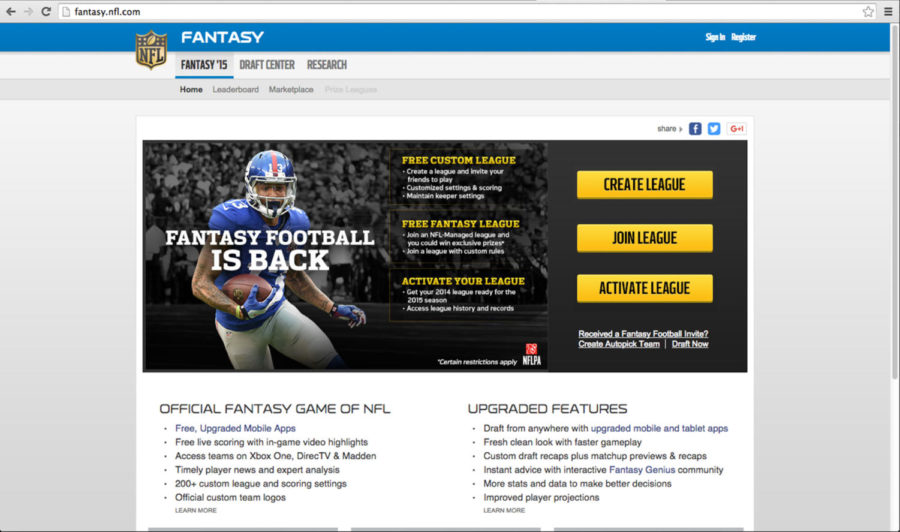Moran: Fantasy sports becoming stressful reality
Courtesy of Fantasy NFL.
Fantasy Football has gone from an american pastime to a money making scheme. Columnist Moran believes that the reward for winning fantasy sports should be bragging rights and nothing more.
September 20, 2015
Time’s ticking away.
The most important decision of your week is about to be made. You’ve done your research, you know you’re plan and you decide: Drafting Adrian Peterson instead of Eddie Lacy is definitely the smart move. But for the rest of the season, you’re left with sweat dripping down your brow on almost any given Sunday.
For the most part, this is the life of a fantasy general manager. Fantasy football includes a season filled with scouting the waiver wire, constant roster changes and surprises every week. Well, this was the norm for fantasy fanatics in years past.
Throughout the years, fantasy sports have become one of the fastest growing trends in America. The Fantasy Sports Trade Association, as reported by Forbes.com, estimates that about 32 million football fans in America will spend roughly $467 per person keeping up their fantasy habits.
These leagues use real-life athletes and teams, and points are assigned based on their performances. For example, in standard fantasy football, a [football] player will score six points for their drafted team every time they score a touchdown.
But a season-long fantasy league is no longer the most popular way to draft because a championship trophy and bragging rights are becoming far less valuable than they once were. People can now earn cash winnings in today’s fantasy football world.
In my opinion, fantasy sports have gotten way out of hand.
I have always enjoyed the simplicity of a season-long league. You join a league, create a draft before the season starts and then update your roster every week. It’s simple, entertaining and makes you more involved than just sitting and watching your team’s victories and losses.
This is one of the most common draft types, but you also have a variety of other, more monetarily involved, choices.
DraftKings and FanDuel offer week-long leagues. Each league allows members to play week by week with no season-long commitment. Each league also uses cash as the reward instead of the formerly coveted bragging rights.
In these formats, you join leagues based on buy-ins. The higher the buy-in, the more money rewarded to the winner. Everyone who plays works with a salary cap, the budget given to a fantasy player to build their draft, and then players are drafted to create a team. Each [football] player has a value assigned to them and the salary cap cannot be broken when drafting a team. The week passes, and the highest point-scoring team wins.
Thankfully, the entire country does not get to help perpetuate this glamorized version of fantasy sports. Sites such as DraftKings of FanDuel prohibit residents of Arizona, Iowa, Louisiana, Montana and Washington from winning cash prizes because of state gambling laws. Participants must be 18 years old in all states except for Nebraska and Alabama, where you must be 19 years old.
Winning cash has become one of the biggest substitutes for a reward in many leagues. My drafts have always been done with my family and friends, and the winner had the privilege of reminding everyone, for a year, that they were victorious.
But nowadays, many of my friends and family participate in week-long drafts with instant gratification in terms of cash rewards. You no longer have to wait for an entire season to end to find out if you are the winner because there is a weekly winner.
Fantasy matchups are also available in Vegas. Bets are placed on certain games, and odds are used to determine the winnings of each bet. This is just another way that fantasy sports have gotten out of hand and have been taken from a fun Sunday pastime to a money-making scheme.
Ironically, during week one of fantasy football, thousands of gamblers watched their money go up in flames as disastrous performances took place. Sports Illustrated reported on one of the worst opening days in Vegas fantasy football history as a majority of teams and players underperformed.
Many new league formats and the increase of cash buy-ins and rewards have led to a growing interest in fantasy football, but the interest doesn’t have anything to do with the love of football.







